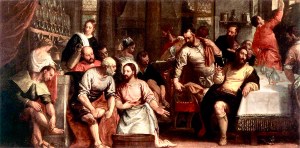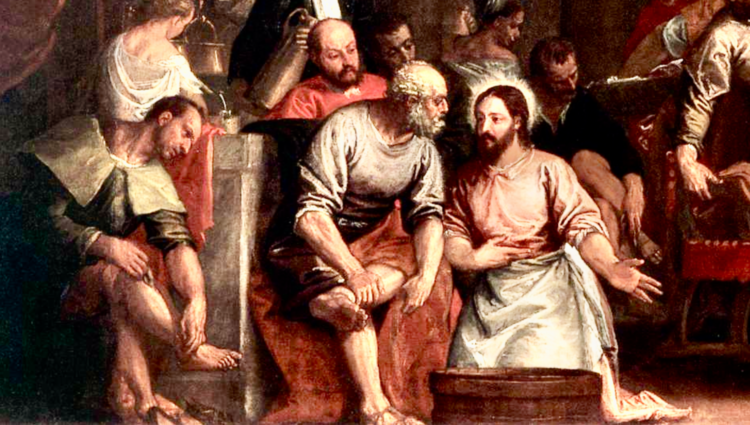 So many gospel themes find their focus on Maundy Thursday, so many threads of connection flowing to and from this deep source of love and vision, in the foot washing, and in the last supper.
So many gospel themes find their focus on Maundy Thursday, so many threads of connection flowing to and from this deep source of love and vision, in the foot washing, and in the last supper.
The meditation in this sonnet, is centred on the ancient idea of the four elements of earth, air, water and fire, for it struck me as I contemplated the events of Maundy Thursday, both the foot-washing and the first communion, that all these elements of the old creation are taken up by Jesus and transformed in the making of the new. Jesus is both the fully human companion cleansing his friends with a gentle touch, sharing his last supper with them, showing the fullness of his love, and he also the Word, God in his full creative and shaping power, the One in and through whom everyone in that room, and every element of the world is sustained in the beauty and particularity of its being. What we witness in the birth of the sacraments is both a human drama and a divine act of new creation. Although we cannot be in church to receive the familiar sacrament of this night, it may be, that if our eyes and ears are open we will sense Christ’s all-transforming presence even through the ordinary elements of the place where we are.
This sonnet, and the others I have been posting for Holy Week are all drawn from my collection Sounding the Seasons.
You can hear me read the poem by clicking on the title:
Here is the source of every sacrament,
The all-transforming presence of the Lord,
Replenishing our every element
Remaking us in his creative Word.
For here the earth herself gives bread and wine,
The air delights to bear his Spirit’s speech,
The fire dances where the candles shine,
The waters cleanse us with His gentle touch.
And here He shows the full extent of love
To us whose love is always incomplete,
In vain we search the heavens high above,
The God of love is kneeling at our feet.
Though we betray Him, though it is the night.
He meets us here and loves us into light.
Republished with gracious permission from Malcolm Guite’s website.
This essay was first published here in April 2022.
The Imaginative Conservative applies the principle of appreciation to the discussion of culture and politics—we approach dialogue with magnanimity rather than with mere civility. Will you help us remain a refreshing oasis in the increasingly contentious arena of modern discourse? Please consider donating now.
The featured image is “Christ Washing the Feet of the Disciples” (1580s) by Paolo Veronese, and is in the public domain, courtesy of Wikimedia Commons. It has been brightened for clarity.


